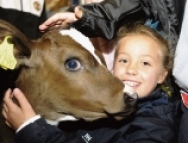With 13 kids in hospital and 37 sick after visiting a UK farm, Health Protection Agency chief executive Justin McCracken has phoned parents of the children most seriously affected to apologise to them.
"If this information had been taken into account on 27 August, then the advice given and the steps taken on 3 September would have been introduced earlier and the farm might have been closed earlier.
.jpg) "I wanted to speak personally to the parents of those children who are most seriously ill in hospital to explain what has happened and, however inadequate under the circumstances, to apologise.
"I wanted to speak personally to the parents of those children who are most seriously ill in hospital to explain what has happened and, however inadequate under the circumstances, to apologise.
"The position they find themselves in is unbearable and it is of course worse that what has happened might have been avoidable."
The farm was closed on Saturday – although the first E.coli case was reported on 27 August.
A pair of two-year-old twins, from Paddock Wood in Kent, have suffered acute kidney failure.
Initially, the HPA said the first case came to light on 27 August.
It later emerged that the agency had received a report of two cases in the previous week.

.jpg) This morning, the
This morning, the .jpg) It has emerged health officials knew about the outbreak among people who visited the farm days before it was closed to the public.
It has emerged health officials knew about the outbreak among people who visited the farm days before it was closed to the public.(1).jpg) Richard, please share with us your knowledge of natural reservoirs of E. coli O157, and the steps you’ve taken to control such dangerous pathogens
Richard, please share with us your knowledge of natural reservoirs of E. coli O157, and the steps you’ve taken to control such dangerous pathogens .jpg) But over time, my own knowledge increased, and I realized that several of these exposes were really just literary clichés, citing a few sources here and there, usually to validate a pre-existing ideal.
But over time, my own knowledge increased, and I realized that several of these exposes were really just literary clichés, citing a few sources here and there, usually to validate a pre-existing ideal.
.jpg) One of the children affected is currently in hospital and is described as ‘poorly but stable’.
One of the children affected is currently in hospital and is described as ‘poorly but stable’. Teachers and school leaders said there were lots of precautions and lots of handwashing. So Shane Morris sent me a picture from the
Teachers and school leaders said there were lots of precautions and lots of handwashing. So Shane Morris sent me a picture from the .jpg) The infections came after a number of recent farm visits, health officials say.
The infections came after a number of recent farm visits, health officials say. *Children must not eat or drink or put their fingers in their mouths whilst close to animals and before washing their hands.
*Children must not eat or drink or put their fingers in their mouths whilst close to animals and before washing their hands..jpg) The New York state Department of Agriculture and Markets.was cited as saying Saturday that residents of Cayuga County and surrounding counties are being warned not to drink or use unpasteurized raw milk sold from a Genoa farm because of possible bacteria contamination.
The New York state Department of Agriculture and Markets.was cited as saying Saturday that residents of Cayuga County and surrounding counties are being warned not to drink or use unpasteurized raw milk sold from a Genoa farm because of possible bacteria contamination.